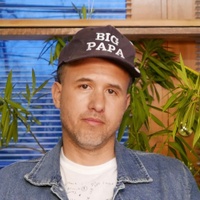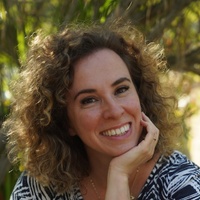On finding what feels right
Singer, songwriter, and producer Lizzy McAlpine on being in the public eye, writing from experience, and following your gut.You’re about to release your third album, Older. How are you feeling?
It’s terrifying. This is definitely the truest, most personal, most me sounding music I’ve ever made. My last albums were amalgamations of all the relationships I’d had until that point, but Older is about one single relationship, and it just feels like my story to tell. I have things to own up to. It’s all me, and people will get to have an opinion about it, and that’s scary.
It also just feels so good. This music feels way better than my old stuff, and it’ll be so much fun to perform. We’re not playing to any tracks on tour. We don’t have a click. I’m bringing my whole band with me, which is seven people including [myself], and we’re creating it all on stage.
Why do these songs feel better to you?
I think it’s because I’m not rushing into a new thing. Usually, when I’m done with an album, I am already writing the next one. But this is who I am right now. I haven’t discovered a new truth about the universe yet, so I haven’t written anything new.
Older’s sound is so distinct from five seconds flat and Give Me a Minute. Can we talk about how your process has evolved?
This album took three years to make, and I switched management three times [along the way], which was difficult. I switched collaborators multiple times; I had to find the right people. It took a long time to get to them, and it took a lot out of me.
We produced an entire album, and then I was like, this isn’t working. We need to pivot. We made [that] first draft of Older the way I’d always made an album: you put all the pieces together, one by one. We recorded all the instruments separately on different days. We would come in, and a drummer would be alone in the booth, recording to a track. And it just didn’t feel right. I couldn’t really pinpoint it. But then I found my band, and we were playing most of these songs live. We were doing a couple live takes, and then picking one and building on it. And it just felt way more authentic. You can hear the band really shine, and I think that’s what the album was missing.
I wanted it to feel emotional. I just wanted it to feel. That was really the goal the whole time.
How do you know when a song is done?
Songwriting-wise, it’s very easy to tell. Sometimes I’ll write a full song with a chord progression that I like, but it won’t feel like the final thing I have to say about a topic. Like, these aren’t the right words. I haven’t gotten to the [core] of what I want to say—I know it’s there, but I haven’t reached it. I’ll usually take that chord progression and write something else with it. And I’ll just keep writing songs until I get to the bottom, just digging layer after layer after layer, and eventually I’ll get to the truest form of that song, and the truth behind what I was trying to say. When I’ll get there, I don’t know, but I’ll always know when I haven’t.
Production-wise, it’s a little harder [to tell] because it feels like you can always add more things, or take stuff out, or make little changes. But for the most part, it’s easy to tell when a song is done. It just feels right—there’s no other metric for it.
A lot of your work has an underlying sense of grief, and that feels especially true of Older. You’ve spoken about your father passing in March 2020—I’m wondering how grief shows up in your practice.
Every 13th track on my albums is about my dad, so that’s what “March” is about on this one. I wrote that song with Ethan Gruska. I’ve never written about my dad with anyone else, but it felt easy to do that with him.
I think grief shows up in my music in a way that’s similar to how it shows up in my life. It just kind of comes up, even when I’m not thinking about it. Like, in the second verse of [the title track] “Older,” “Mom’s getting older / I’m wanting it back”—that just came out, and I rolled with it. I wasn’t thinking, I’m going to write about grief now. It’s an ever-present thing in my life, especially over the past three years, and that’s going to show up in my songs because it’s part of who I am.
Do you write more from experience or imagination?
I have a hard time writing about things that haven’t happened to me. I might take a situation and embellish a little bit, but for the most part, I only write about stuff that’s actually happened. If I haven’t experienced something, how am I supposed to write deeply about it? How can I avoid saying what everyone else has already said? I can only write something new about a feeling or an experience if I’ve been through it.
I put voice memos in my songs sometimes. I didn’t do it as much on this album, but I like to use things from my real life. I think it adds to the experience. I don’t know. I mean, I’m just following my gut, you know?
I have an anxious brain, so I find it tricky to differentiate between instinct and anxiety.
I mean, same.
What does “following your gut” mean to you?
Yeah, it’s hard to tell whether I’m feeling nervous about something, or if it really isn’t right for me. But in my career, I know exactly what I want to do most of the time. When someone brings me an opportunity, it will immediately be a [straightforward] yes or no. Following my gut really just means making decisions that will safeguard my mental health. Part of what feels right about something is that it won’t destroy me. I know myself extremely well—maybe a little too well—so I try to make all my decisions based on what I’ve learned makes me feel good and bad and everything in-between. I follow what will make me feel the best and not want to quit all the time. As long as I don’t want to quit, I’ve done my job.
Is that philosophy guiding this album cycle?
Definitely. Like, I always start out my tours feeling excited about playing my music for people, but it [eventually] takes a toll on my physical health. On my last tours, I wasn’t sleeping. I really wasn’t eating that much. I’ve lost so much weight on every tour. I got sick—I had every ailment you can think of: ear infection, pneumonia, laryngitis. I had the flu. I was like, my body is literally rejecting this. This must not be good for me. I guess some people can do it, but I am not one of them.
I had to go through that to learn what wasn’t working for me. I went to my agents this time around, and I said, “we need to spread the [tour] dates out.” We need to start earlier. Doors will be at seven every night instead of eight, so we can go on earlier. And there’s no opener, so I’ll be done earlier.
My dream was never to be a touring artist. I actually wanted to be on Broadway when I was younger. I’m introverted, and I get overstimulated easily, and it’s hard for me to be the [sole] focus of a large crowd. But it just kind of happened because touring is the norm, and it’s the next step when you’re trying to become an artist. This is just what you do, what everyone has done to get here. But it felt horrible, and I was miserable, so I’m doing things differently this time.
I imagine it must feel daunting to defy the industry norm.
It’s challenging to re-educate people on other ways that you can do touring or an album rollout. But doing what everyone else has done was obviously not right for me, and I think that’s always been the case. Of all my friends, I was the only one who dropped out of Berklee—everyone else stayed and finished the last two years. It was really lonely. I didn’t feel like people around me understood what I was doing.
I’ve tried to follow the norm, and it’s never worked for me, so now I’m kind of breaking that. I feel like people get mad no matter what I do. I just have to keep making decisions that will benefit me.
That sounds really healthy. How do you define success for yourself?
Before I started working on Older, it was different. I think I wanted to be “famous.” I don’t like that word, but I wanted to be a public figure and do cool things and play big shows. Now, I just want to make art. Success is when I make something that I’m proud of. I don’t care about being in the public eye. I actually don’t like being in the public eye. It’s detrimental to my mental health.
But it also seems unavoidable, career-wise.
It’s tough. I’m sensitive and for a long time, music was just fun. I’ve been singing forever. I would come home from pre-school and teach my parents the songs I’d learned. I started playing piano in fourth grade and writing songs in sixth grade, and I wasn’t thinking, I’m going to make this my career. Music was my hobby. It’s only recently started feeling like an actual job, where it’s not just fun anymore.
The process of making this album—facing roadblocks at every turn—was disheartening, and I think I lost a bit of the joy [I had] for music. I’m trying to find it again. After this tour, I’m taking a long, long break. I want to focus on acting. I really want to do theater. I miss it so much, and I’m just waiting for the right opportunity.
What are you doing to rekindle that joy?
During this rollout, it means playing with my band more. I’ve discovered so much about myself and about the way I want to make music, and I’m just finding ways to make it fun.
I love these songs. I want people to understand them, and I want people to understand the way that I have changed my approach to music and my career and touring. I just want to be understood.
Lizzy McAlpine Recommends:
The Sirens of Titan by Kurt Vonnegut. One of my favorite books ever.
Ryan Beatty’s album Calico is fantastic. It’s also how I found my band—I went to one of his shows, and they were playing with him.
Society of the Snow on Netflix. The cinematography is literally amazing.
Legos, in general. They’re so fun, and they bring out your inner kid.
The Bee Sting by Paul Murray. The book is like 600 pages, but I wanted more. It’s about how doing one thing differently can change your whole life trajectory. It’s so, so good. I honestly might read it again.




